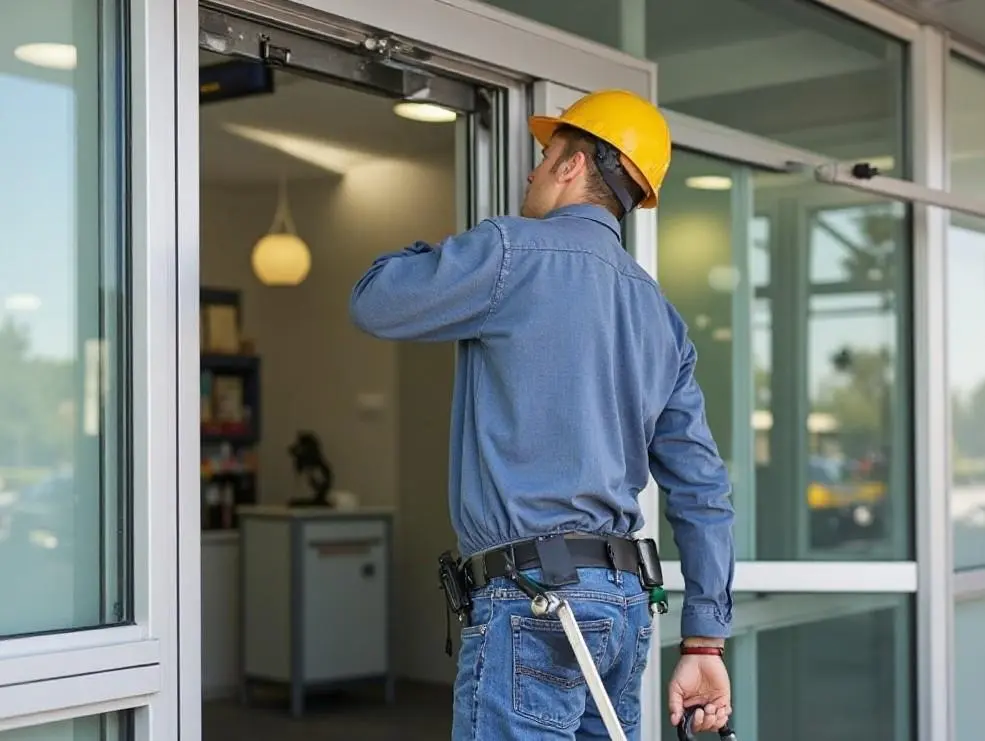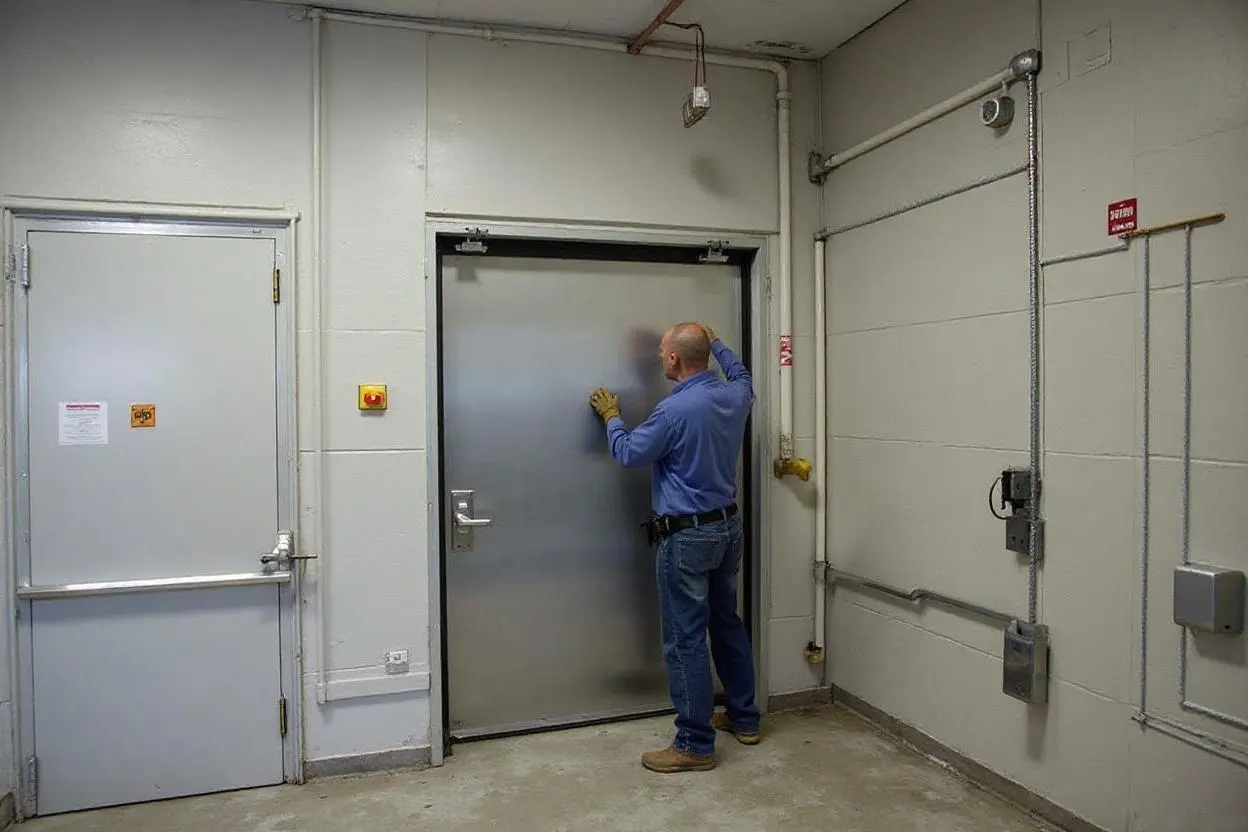Commercial Spaces in Buffalo Rely on 24/7 Automatic Sliding Door Service
Automatic sliding doors carry the flow of Buffalo’s foot traffic every day. Hospitals near the Medical Campus, grocery stores in North Buffalo, hotels along Delaware, and retail in Cheektowaga all depend on doors that open on cue and close safely. When a sensor misreads, a header motor drags, or a leaf comes off track, operations slow and safety risks rise. This is why property managers search for automatic sliding doors repair Buffalo at the first sign of trouble—and why many keep A-24 Hour Door National Inc. on speed dial.
What fails first on automatic sliders
Most emergency calls trace back to a few parts that work hard all day. Sensors collect salt spray and dust, rollers flatten, belts stretch, and control boards throw intermittent faults after a power surge. Winter compounds the issue. Subzero mornings by the waterfront lead to stiff seals and slow starts; lake-effect snow tracked in from parking lots leaves wet mats and slick thresholds. The result can be door bounce, short cycling, or a full stop with doors stuck half-open.
A-24 Hour Door National Inc. sees patterns by neighborhood. High-wind corners in downtown Buffalo show more misalignment from repeated door slams. Suburban plazas near Transit Road see more impact damage from carts. That context matters when diagnosing, because the best repair balances speed, safety, and long-term stability.
Signs your sliding doors need service now
Safety comes first with automatic doors. Any condition that confuses a sensor or drags the door leaf can cause an unsafe close or a wide-open security gap. A quick field rule: if the door behavior changes, it needs attention. Here are the red flags that trigger an immediate service call:
- Doors shudder, hesitate, or reverse without a person present
- Doors remain open during normal traffic or after hours
- Scraping sounds from the header or noticeable belt squeal
- Intermittent sensor pickup, especially with children or mobility devices
- Error codes on the control panel or breaker trips after storms
These issues appear in both older units and newer systems. A 12-year-old operator might have worn rollers; a one-year-old install can still show misaligned safety beams after a cart strike.
What 24/7 repair looks like in Buffalo
A reliable emergency response is more than a van and a tech. It means local parts stock, familiarity with major brands, and a process that locks down a site quickly. A-24 Hour Door National Inc. dispatches technicians across Erie County day and night. Typical on-site steps look like this:

- Make safe and secure: place the unit in a safe mode, set signage, and control traffic.
- Diagnose: read the control board, test presence and safety sensors, inspect belts, rollers, and track.
- Correct or contain: replace a failed sensor or belt from the truck stock; if a special part is required, secure the opening with manual lock, mag lock, or temporary barricade where appropriate.
- Document: record brand, model, serial, and findings so future service is faster and more precise.
- Verify: run full open/close cycles with real traffic, including carts and mobility devices, to confirm safe operation.
The company’s night and weekend jobs often involve ADA entrances for clinics in Allentown or 24-hour convenience stores in South Buffalo. Keeping those doors moving protects revenue and patient access.
Common repairs that stabilize performance
Most automatic sliding doors return to service the same day. The following fixes cover A-24 Hour Door National Inc: automatic sliding doors repair Buffalo a large share of calls:
Sensor recalibration and replacement: Overhead presence sensors and side screens drift over time or clog with debris. In winter, infrared sensors can misread cold bodies at the threshold. Cleaning and recalibration takes minutes; full replacement typically runs under an hour.
Track and roller service: Flat-spotted or cracked rollers create drag and noise. A tech checks the track for dents from impact and resets alignment. In plazas near snow pile zones, salt corrosion on the track is common and needs neutralization before roller replacement.

Drive belt and motor: Belts stretch and glaze, causing slow starts and stalls. Motors overheat in heavy use sites such as airport hotels. Replacing a belt and tensioning it correctly prevents head unit strain and protects the gearbox.
Control board and power quality: After summer storms on the West Side or winter outages near Hamburg, boards may show fault codes. Surge protection and a board swap solve repeat trips. Documenting line voltage and grounding prevents recurring problems.
Header cleaning and wiring: Dust and metal filings inside the header confuse sensors and jam moving parts. A thorough clean and a check of wire terminations often removes mysterious intermittent issues.
Preventive maintenance that pays for itself
Emergency calls are costly because they hit at the wrong time. A simple quarterly plan reduces those calls and extends component life. Property managers across Amherst and Tonawanda schedule maintenance to coincide with seasonal shifts. Before the first snow, a tech checks weather seals, mat sensors, and heater strips if installed. In spring, they address corrosion and confirm sensor fields after floor work.
A realistic cadence for busy retail is quarterly. For office lobbies with moderate traffic, semiannual service works. Cost-wise, one avoided after-hours call in a year usually covers the plan. In practice, maintenance also guards compliance with ANSI/BHMA A156.10 and A156.38 by checking approach speeds, hold-open timing, and safety zones.
Safety and compliance without drama
Automatic doors are life-safety equipment. A-24 Hour Door National Inc. trains techs on ANSI standards and manufacturer procedures for brands common in Buffalo. That includes sensor placement, presence detection patterns, and test routines with an obstacle. After a repair, technicians run a documented test sequence. For hospitals and schools, that documentation matters during audits and insurance reviews. The team also advises on proper signage, sight lines, and approach lighting for winter evenings.
One recurring edge case in Buffalo winters: cold-induced condensation on sensor lenses near vestibules. It can cause false presence readings and constant open states. The fix may be as small as an anti-fog lens treatment and minor door speed adjustment. That judgment comes from field experience, not guesswork.
Local conditions that shape repair choices
Buffalo’s climate and building stock influence specific recommendations. Many storefronts were upgraded in phases. A modern operator may sit on an older frame and door leaf. Mixing generations can work, but it changes torque settings and sensor fields. Technicians factor that into every repair to avoid band-aids that fail on a busy Saturday.
Snow management affects doors more than most owners expect. If plows leave piles near entrances, drifting snow triggers side screen sensors. Redirecting piles by a few feet can eliminate weekly nuisance calls. Flooring matters too. New high-gloss tiles make for stronger reflections, which impact infrared sensors. Calibrating for that finish reduces phantom closes.
Why businesses choose 24/7 service instead of next-day
Downtime costs vary by site. A grocery store on Elmwood loses basket flow instantly with a stuck door. A hotel near the KeyBank Center risks negative reviews if guests carry luggage through a side entrance. Clinics need ADA access without delay. Round-the-clock automatic sliding doors repair Buffalo is not a luxury in these cases; it is operational continuity.
Rapid site control also reduces liability. If a tech can place a unit in a safe open or secure mode within an hour, property managers avoid makeshift fixes like door chocks or tape over sensors. Those quick choices invite accidents. A-24 Hour Door National Inc. carries the parts, tools, and authorization to set the unit correctly.
Brands, parts, and what to expect on pricing
Most service calls involve mainstream systems. Trucks stock common sensors, rollers, belts, locks, and boards compatible with widely used operators. Specialized parts may require a short lead time. For transparency, the process includes a written estimate before major components are ordered.
Repair costs vary with scope. A sensor cleaning and calibration is at the low end. Roller and belt replacement sits in the middle range. Control board replacement and complex header work cost more and may involve return visits. Many managers prefer a small inventory of site-specific spares on hand for critical entrances to avoid waiting on shipping during storms.
A brief story from the field
A medical office near Hertel called at 6:15 a.m. on a Tuesday. Their main vestibule door cycled open and stayed there. The early tech found salt crust inside the header, a glazed belt, and a side screen sensor reading reflections from wet tile after overnight cleaning. He cleaned the header, replaced the belt, recalibrated the sensors for the brighter floor, and ran test walks with a wheelchair and a stroller. Doors were stable before the first patient arrived. That same office now schedules pre-winter maintenance and has not had an early morning call in over a year.
How to prepare your site before a tech arrives
Small steps speed the repair and reduce disruption:
- Clear five feet of space around the entrance and inside the vestibule
- Hold carts, pallets, or deliveries until testing is complete
- Have someone with alarm or building system access available
- Share recent power issues or flooding that might affect wiring
- Provide brand and model from the header label if possible
These actions cut diagnosis time and limit the period of controlled access while work is underway.
Ready access across Buffalo and nearby suburbs
A-24 Hour Door National Inc. covers Buffalo neighborhoods and nearby areas: downtown and the Theatre District, Elmwood Village, North and South Buffalo, Black Rock and Riverside, Kenmore and Tonawanda, Amherst and Williamsville, Cheektowaga and Depew, West Seneca, Orchard Park, and Lackawanna. Technicians know the quirks of each area, from wind tunnels on Main Street to strip mall logistics along Transit Road.
Call A-24 Hour Door National Inc. for 24/7 automatic sliding door repair
If an entrance is stuck, cycling, or unsafe, call A-24 Hour Door National Inc. for automatic sliding doors repair Buffalo. The team answers day and night, secures the opening on arrival, and solves the problem with clear communication and practical choices. For property managers planning ahead, ask about seasonal maintenance that folds neatly into your operations calendar. One call restores safe flow and keeps your doors doing the quiet work that keeps Buffalo moving.
A-24 Hour Door National Inc provides commercial and residential door repair in Buffalo, NY. Our technicians service and replace a wide range of entry systems, including automatic business doors, hollow metal frames, storefront entrances, fire-rated steel and wood doors, and both sectional and rolling steel garage doors. We’re available 24/7, including holidays, to deliver emergency repairs and keep your property secure. Our service trucks arrive fully stocked with hardware, tools, and replacement parts to minimize downtime and restore safe, reliable access. Whether you need a new door installed or fast repair to get your business back up and running, our team is ready to help. A-24 Hour Door National Inc
344 Sycamore St Phone: (716) 894-2000 Website: https://a24hour.biz/buffalo
Instagram: @a24hourdoor
Buffalo,
NY
14204,
USA
Facebook: 24 Hour Door
Yelp: A-24 Hour Door National (Buffalo)
X (Twitter): @a24hrdoor